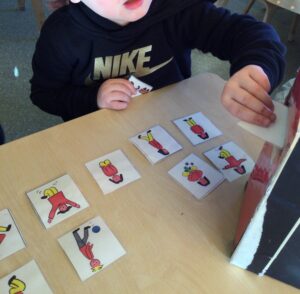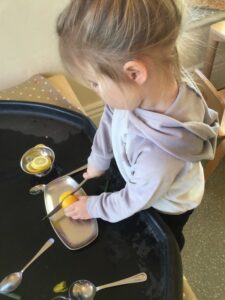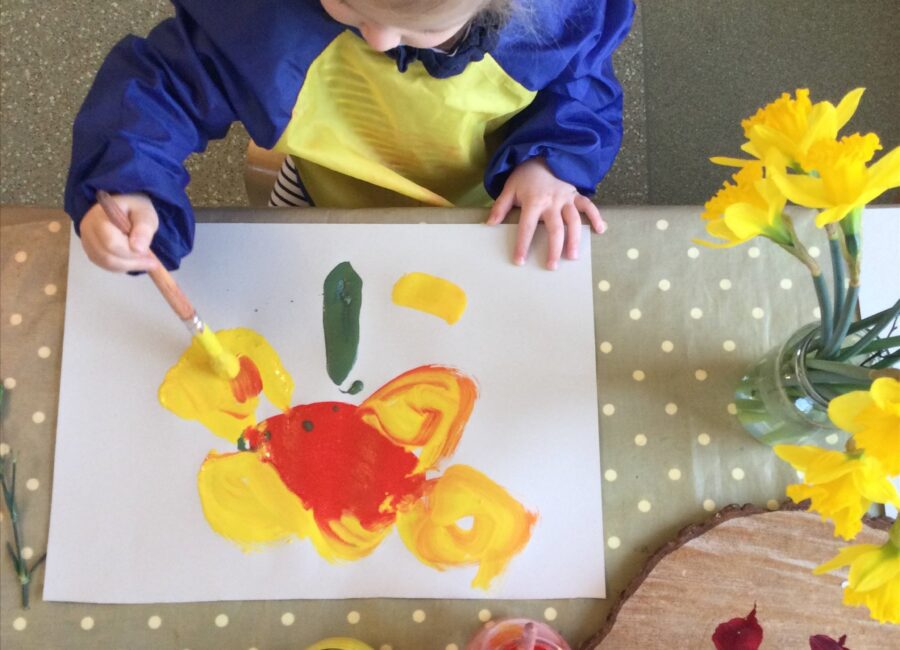Having a good vocabulary (knowing and understanding words) is important for children when they are learning to talk; it has an impact in lots of different ways. Children with poor vocabulary at 2yrs tend to do less well at school by 7yrs old (Hart & Risley, 2003). It is therefore important that we work together to support children’s language development.
Using the right language right from the start is vitally important – don’t use slang words such as doggy for dog, otherwise they will have to learn another word later on as they grow.
I know learning new words is important for children but why?
A good vocabulary (the number of words you know and can say) is really important for all children. It is an important building block for helping children to talk in sentences, but it is also really useful for learning to read. So, helping children to develop a good vocabulary is vital.
The link between play and vocabulary development
- Children need to explore new things. From this they will gradually learn all about the new object. They learn what it looks like and feels like.
- The child learns what to do with the object.
- By 9 months old a child will learn how to use objects appropriately. E.g. if given a hair brush they will brush their hair, a toothbrush is for brushing teeth and a sweeping brush for brushing the floor – this is called ‘defining an object by use’.
- This type of play is very important because it suggests that the child is storing information in their mind and is developing an internal awareness or idea for various objects.
- Children need to store information because it means that they can remember it for next time when they use the object. Over time they will gradually add more information about the object including how to recognise and say the word when someone says, for example ‘brush’.
- Over time the child will hear the word for the object over and over again until eventually they learn the pattern of sounds (phonemes) represents the word e.g. /b/ /r/ /u/ /sh/ = brush.
Play and everyday experiences are crucial for the development of children’s vocabulary.
How many words should children know by when?
We have typical milestones for how and when children learn new words. Usually:
- Children say their first words about the age of one (although they understand them for some time before this).
- By about 18 months children should use about 20 words, but they’ll understand more.
- By two years old, we expect children to say 50 words and understand between 200 and 500.
- By three years old they’ll be able to use about 300 words.
- By the time a child reaches five years old they’ll know and use as many as 2,500 words.
Children between 18 months and 6 years old should therefore learn 8 new words a day.
Is there anything else I can do to help children to learn new words?
Learning new words is tricky. There are lots of things children have to be able to do to understand and say a new word and get it right. They have to remember the sounds they hear and the order they come in, they have to find a meaning for the word and then they have to work out where it might go in a sentence. There are lots of different things you can do to help children’s vocabulary development. Here’s just a few:
- Find a quiet space, turn off screens, radios and televisions – with no other distractions your little one will be able to hear you better and you can give them your full attention.
- Having a child’s attention is important for word learning. Saying an object’s name while helping a child to look at it helps them to learn and remember names for objects that they haven’t seen before.
- Be face to face with your child so they can see your facial expressions and see the words coming out of your mouth. Speak slowly and try to speak in sentences which are only 1 or 2 words longer than the child’s sentences.
- We know that having words and objects together is really helpful for early language development, from around six to 18 months. So, it helps your child to see the object you are talking about, as well as hearing its name. This helps them to make the connection and gives you the chance to explain what new words mean. Young children will learn more from seeing, feeling and touching an object than from a picture of it.
- Watch what children are exploring and doing then you can say the name of an object or action. This way you’re modelling the word for them – saying what something is called, showing them the way to say it and letting them know the speech sounds that make up the word.
- Encourage children to use new words by giving them choices. So, rather than saying “would you like a snack?” ask them “do you want raisins or cucumber?” You can do this when you’re joining in with play during any activity e.g. ‘shall we splash the water or pour it?’ ‘Do you want the big bucket or the small bucket?’ Also add new ‘sophisticated’ words to extend your child’s vocabulary.
- Repetition is really important. Children need to hear new words lots of times before they learn it properly, so keep saying the word you want them to learn! They may try to copy you and will often take a few attempts to get it right. Repeating experiences gives children a chance to try out things they’re learning and the words for these experiences.
- Building on what they know already can help children to extend and expand their vocabulary. This is why open ended activities such as sand, water, playdough, painting, craft, home corners (inside and out) can be used as a basis for varying the activities and the vocabulary that goes alongside.
- Talk about how words are linked together and how they link to words they already know. They might be similar in what they mean (tall, high, long), or be words in the same group (cat, dog, hamster). Talking about these things helps children learn words well. You can also start naming different types of one thing, for example, if you are playing with dinosaurs you might say ‘dinosaur’ for younger children but as children get older you can name the different types of dinosaurs e.g. ‘that’s a tyrannosaurus – he’s got really sharp teeth’ or ‘that one is a herbivore’.
- There are different types of words and children need to learn them all. So, they need a good vocabulary of doing words (like walking, swimming, eating, pushing, describing words (like big, heavy, red), and words that can be used to name things (like dinosaur, shark, juice).
- Make it easier for they to talk – dummies can get in the way of talking – try to use they must t sleep time.
Useful links
Talking Point I CAN’s Talking Point
I CAN Help www.ican.gork.uk
Babbling Babies activity pack
Toddler Talk activity pack
Chatting with Children activity pack
Hungry Little Minds Campaign www.hungrylittleminds.campaign.gov.uk
NSPCC Look, Say, Sing, Play Look, Say, Sing, Play – Brain-building tips | NSPCC
BBC Tiny Happy People www.bbc.co.uk/tiny-happy-people



